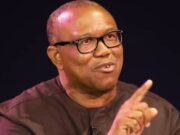The President Bola Tinubu-led Federal Government earned about ₦21.22tn as revenue from the activities of five revenue-generating agencies in the first six months of 2025.
This shows that the government intensified its drive to boost the nation’s income, rolling out aggressive collection strategies, tightening enforcement measures, and expanding its operational reach to capture more taxable and non-taxable revenue streams.
However, the ₦21.22tn earnings in just six months did not stop the government from courting foreign lenders for loans and grants, The PUNCH can report. The half-year windfall, driven by stronger tax collections, oil royalties, and customs duties, has not slowed the nation’s aggressive borrowing push, a move economists warn could deepen Nigeria’s debt burden and strain its finances in the long term.
The amount generated was distributed among the three tiers of government, including the federal, state, and local governments, in line with the country’s revenue allocation formula to fund critical projects and services nationwide.
An analysis of the revenue performance of five major government agencies between January and June 2025 showed a strong inflow of funds, with tax receipts, customs duties, and oil royalties surpassing projections.
The data, contained in financial reports submitted to the Federation Accounts Allocation Committee and obtained on Monday, underscores the government’s improved revenue mobilisation drive under the 2025 budget. Recall that last year, after the Senate approval, the government approved a N54.2tn budget tagged “Budget of Restoration: Securing Peace, Rebuilding Prosperity”.
The spending plan was increased from the earlier N49.7tn proposal on the back of higher-than-expected collections from key revenue-generating agencies. The 2025 fiscal framework targets N36.35tn in total revenue, anchored on an expanded tax base, enhanced customs operations, higher returns from government-owned enterprises, and robust oil receipts based on a crude benchmark of $75 per barrel, a daily production target of 2.06 million barrels, and an exchange rate of N1,500 to the dollar.
Six months into the implementation of the 2025 budget, fresh figures have shown that five key revenue-generating agencies have collectively earned over N21.22tn, generating a substantial amount of their revenue target and putting the Federal Government more than halfway towards meeting its full-year revenue target.
Data obtained by The PUNCH revealed that the Federal Inland Revenue Service led the pack, collecting a record N13.76tn between January and June 2025. The Nigerian Upstream Petroleum Regulatory Commission followed with N5.21tn in oil royalties and related earnings, while the Nigeria Customs Service contributed N2.02tn through the collection of import duties and tariffs.
The Ministry of Mines and Steel Development generated N32.39bn, while the Nigerian National Petroleum Company Limited reported earnings of N197.8bn from its commercial operations. But in its monthly report, the NNPC disclosed that it had remitted N6.96tn in statutory payments between January and June 2025. This doesn’t tally with the figures submitted to FAAC.
The combined amount represents about 42.23 per cent of the N50.2tn revenue target set for FIRS (N25.2tn), NUPRC (N15tn), and NCS (N10tn). It is also 58 per cent of the government’s N36.35tn projection for 2025, indicating that the administration is on track to surpass its fiscal year targets if the momentum is sustained.
However, despite the strong performance, the government has continued to court foreign lenders for loans and grants to plug budget deficits and fund large-scale infrastructure projects. The government has maintained an aggressive borrowing posture, turning to multilateral lenders, bilateral partners, and foreign financial institutions to finance its fiscal deficit and fund critical infrastructure.
Data from the Debt Management Office showed that Nigeria’s total public debt rose to N149. 39tn as of March 31, 2025, marking a year-on-year increase of N27.72tn or 22.8 per cent compared to the N121. 67tn recorded in the corresponding period of 2024.
Total debt to the World Bank rose to $18.23bn as of March 31, 2025. This marks a $420m increase in just three months since December 2024, when Nigeria’s total exposure to the World Bank stood at $17.81bn. The DMO data showed that borrowings from the International Development Association, the concessional financing arm of the World Bank, rose from $16.56bn in December 2024 to $16.99bn in March 2025.
At the same time, loans from the International Bank for Reconstruction and Development, the non-concessional lending window of the World Bank, remained unchanged at $1.24bn. In total, the World Bank Group now accounts for $18.23bn, or about 39.7 per cent of Nigeria’s total external debt stock, which stood at $45.98bn as of March 2025.
Further analysis indicates that the World Bank now constitutes 81.2 per cent of Nigeria’s total multilateral debt, which reached $22.43bn in Q1 2025. This represents a rise from the 79.8 per cent share recorded at the end of 2024 and underlines the central role the institution continues to play in Nigeria’s financing framework.
Similarly, the current administration’s approved borrowing plans could add about N38.24tn to the existing debt stock, potentially raising Nigeria’s total public debt from N144.67tn at the end of 2024 to over N182.91tn by 2026. The fresh borrowing, which has received legislative approval, is composed of $21.54bn, €2.19bn, and ¥15bn. Using the latest market exchange rates, €1 to $1.1381 and ¥1 to $0.0068, the euro component converts to approximately $2.5bn while the Japanese yen translates to $102m.
In total, the new loans amount to an estimated $24.14bn. When converted at the official rate of N1,583.7388 to the dollar, the naira equivalent of these loans comes to N38.24tn. The PUNCH further observed that Nigeria expects approval on three more loans and a grant from the World Bank before the end of 2025, a development that could push total commitments from the institution between June 2023 and December 2025 to $9.65bn (N14.82tn).
The additional $1.25bn (N1.92tn) in IDA loans and $10.5m (N16.12bn) in grant funding would raise the country’s exposure to the bank even further, despite persistent concerns over debt sustainability and sluggish revenue growth. One of the expected facilities is the $250m (N383.98bn) Health Security Program in Western and Central Africa, Nigeria – Phase III, aimed at strengthening regional collaboration and health system capacities to prevent, detect, and respond to health emergencies.
Another is the Building Resilient Digital Infrastructure for Growth Project, which seeks $500m (N767.97bn) to expand inclusive access to climate-resilient broadband internet in underserved parts of the country. Also in the pipeline is the Nigeria Sustainable Agricultural Value-Chains for Growth Project, with a proposed $500m (N767.97bn) allocation to foster sustainable growth and job creation across selected agricultural value chains.
Already, the government has secured about $1.08bn in loans in 2025, including $500m (N767.97bn) in March to improve foundational learning outcomes and strengthen education systems under the HOPE for Quality Basic Education for All Project.
In the same month, $80m (N122.88bn) was committed to the Accelerating Nutrition Results in Nigeria 2.0 Project, alongside another $500m (N767.97bn) for the Nigeria Community Action for Resilience and Economic Stimulus Programme aimed at expanding livelihood support and food security services.
The PUNCH further observed that Nigeria secured $122.19m (N187.56bn) in grants for two projects. In a recent statement, the World Bank disclosed that a new loan of $300m (N460.78bn) was approved to Nigeria on August 7, 2025, for the Solutions for the Internally Displaced and Host Communities Project.
Economists warn that the rising loan pipeline, while potentially beneficial for long-term development, could deepen fiscal pressures if not matched with stronger domestic revenue mobilisation and prudent expenditure management. Speaking in an earlier interview, Development economist and CEO of CSA Advisory, Aliyu Ilias, expressed strong reservations over Nigeria’s rising debt profile in light of fresh World Bank commitments.
He recalled that when former President Muhammadu Buhari left office for President Bola Tinubu, the nation’s debt stock stood at about N87tn, but has since risen to around N149tn, with fears it could approach N180tn. While acknowledging that borrowing is not inherently bad for an economy, he questioned the rationale for taking on more debt at a time when the government claims to have higher revenues.
Ilias pointed out that following the removal of fuel subsidy, Tinubu had announced increased revenue inflows. He added that with both the Federal Inland Revenue Service and the Nigeria Customs Service declaring revenue surpluses, the government should be able to fund projects without resorting to heavy borrowing.
According to him, the impact of the current borrowing spree is being felt in reduced public service delivery, particularly in capital expenditure, as debt servicing now consumes a significant portion of available revenue. He warned that this crowding-out effect limits job creation, fuels inflation, and worsens Nigeria’s foreign exchange imbalance, with the naira trading at historically weak levels.
He argued that given the claimed revenue surpluses, the Tinubu administration should not have needed to borrow within its first two years in office, let alone at the scale currently being witnessed.
An economist, Adewale Abimbola, reacting to the rising World Bank commitments to Nigeria, said loans from multilateral institutions such as the World Bank are largely concessionary, with interest rates typically below market levels and longer repayment tenors.
He noted that the critical question is not whether Nigeria should be borrowing, but whether the loans are structured and deployed effectively. “If it’s concessionary and tied to viable projects with medium-term revenue prospects, I don’t think it’s a bad idea,” Abimbola explained. “Borrowing isn’t bad; what matters is utilisation.”
He stressed that the economic impact of such loans depends on how well they are channelled into projects that can generate sustainable growth, strengthen revenue, and improve public services over time.
The Chief Executive Officer of the Centre for the Promotion of Private Enterprise, Dr Muda Yusuf, on his part, lauded the revenue performance of key government agencies, describing it as a positive signal for the economy. According to him, the amount generated so far shows that the agencies are living up to expectations and, if the current momentum is sustained, they are likely to surpass their annual targets.
He noted that the strong revenue inflow indicates that the economy is gradually recovering, as higher remittances often reflect improved performance by companies operating in the sector.
“The amount generated by the agencies shows that they are living up to expectations, and if they are moving at that rate, they are likely to surpass their target at the end of the year. This means that the agencies are working well, and it is also an indication that the economy is gradually recovering. Because if the companies are not doing well. They won’t be getting that much revenue.
“Also, it shows that the reforms that have been taking place in some of those agencies are also working,” he stated.
Yusuf added that the figures also point to the effectiveness of ongoing reforms within some of the agencies. “More importantly, the revenue from the NNPC Limited is encouraging because that is where shortfalls have often been recorded in the past,” he said.
On the issue of debt, the economist explained that the budget already anticipated a borrowing component due to its inherent deficit. However, he stressed that with improved revenue performance, the government may not need to exceed the stipulated deficit. “Meeting revenue expectations means that the scale of borrowing should reduce, which in turn will ease the burden of debt servicing,” Yusuf said.
Credit: punchng.com











































































